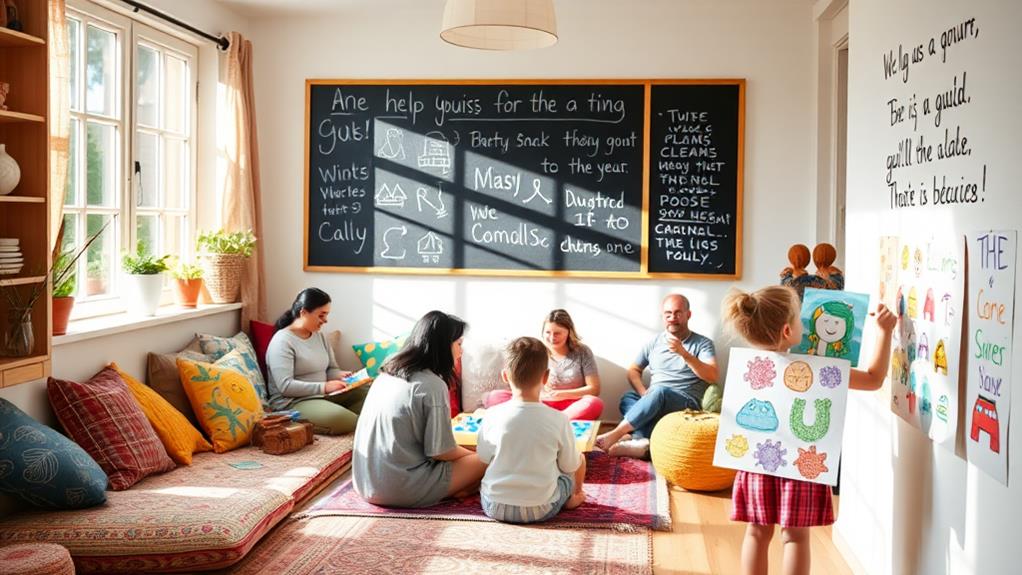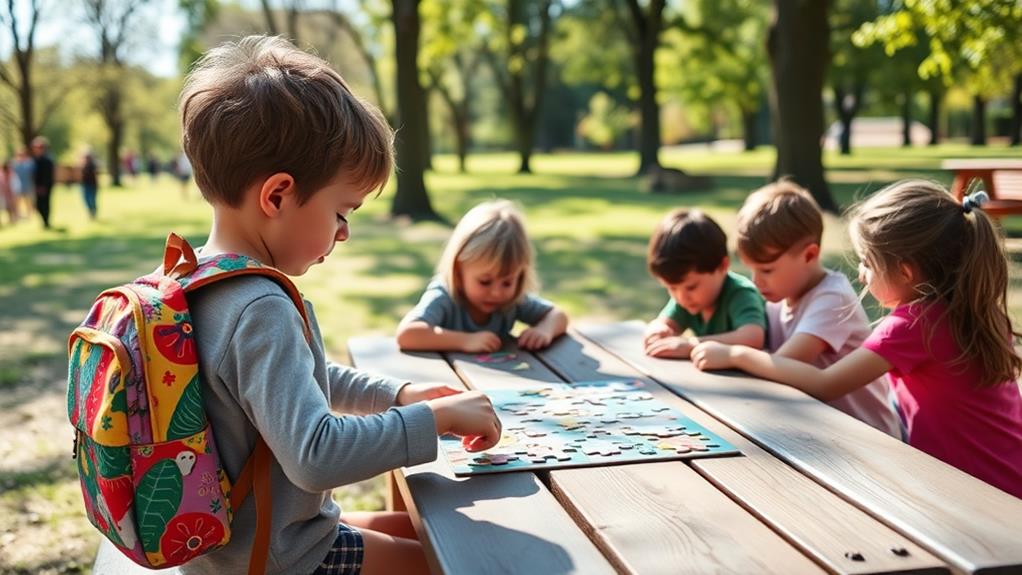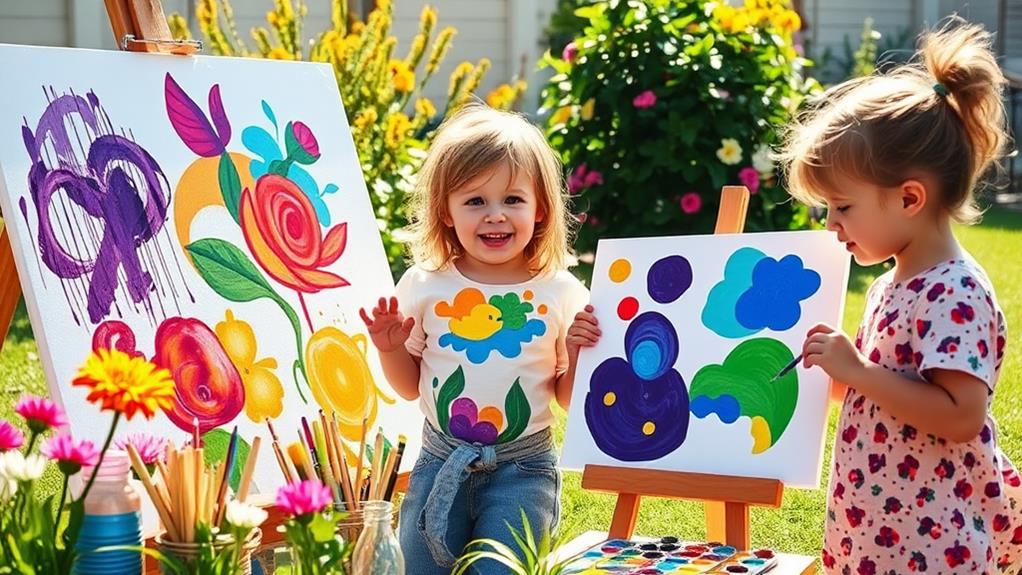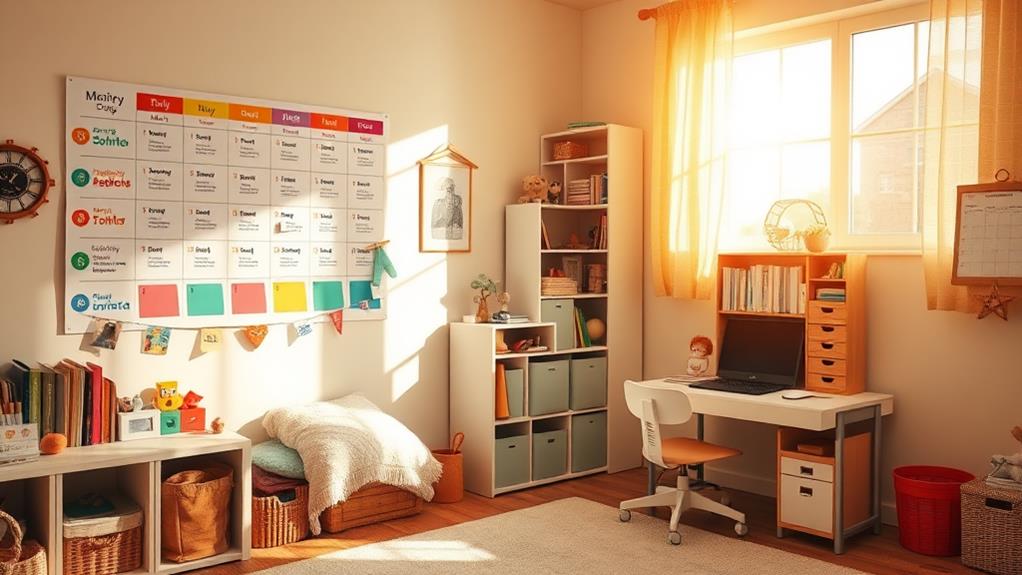Boosting your child's confidence is essential, and it starts with simple, yet effective strategies you can implement at home. By encouraging open communication and celebrating even the smallest achievements, you lay the foundation for their self-belief. Setting realistic goals and providing constructive feedback can further nurture their growth. But it doesn't stop there; incorporating fun activities that spark creativity and teamwork can make a significant difference. As you explore these tips and activities, you might find some unexpected insights that could transform your approach to building their confidence. What could these insights be?
Encourage Open Communication

Encouraging open communication is crucial for boosting your child's confidence. When you create a space where your child feels comfortable sharing their thoughts and feelings, you help them develop a sense of self-worth.
Start by actively listening when they speak. Show genuine interest in what they say, and avoid interrupting. This signals that their opinions matter to you.
Ask open-ended questions to invite deeper conversations. Instead of yes or no questions, try asking, "What was the best part of your day?" or "How did that make you feel?" This encourages them to express themselves fully.
Be mindful of your reactions too. If they share something that worries them, respond with empathy and understanding, rather than judgment. Let them know it's okay to feel vulnerable.
Also, share your own experiences and feelings. This not only models open communication but shows them that everyone faces challenges.
Celebrate Small Achievements
Recognizing and celebrating your child's small achievements can significantly boost their confidence. When your child completes a task, no matter how minor it may seem, take a moment to acknowledge their effort. This could be as simple as praising them for finishing their homework on time or mastering a new skill. Your positive reinforcement reinforces their belief in their abilities.
Make it a habit to celebrate these milestones at home. You can create a "success jar" where they can drop in notes about their achievements, big or small. At the end of each week, sit down together and read through them. This not only highlights their progress but also fosters a sense of accomplishment.
Additionally, consider small rewards like stickers, an extra bedtime story, or a fun outing to mark these achievements. These gestures don't need to be extravagant; what matters is the recognition of their hard work and persistence.
Set Realistic Goals

Break these goals into smaller, manageable steps. This way, your child can see progress and feel motivated as they complete each step.
Celebrate these milestones, no matter how small, to reinforce their efforts and build their self-esteem.
It's important to remind them that setbacks are a natural part of the learning process, so encourage resilience and flexibility in adjusting their goals if needed.
Provide Constructive Feedback
Constructive feedback is essential for helping your child grow and build confidence. When you offer feedback, focus on specific behaviors rather than making it personal. Instead of saying, "You're terrible at math," try, "I noticed you struggled with those problems. Let's review them together." This approach encourages improvement without dampening their spirit.
Be sure to highlight what they did well, too. Positive reinforcement boosts their self-esteem and makes them more receptive to suggestions for improvement. For example, if your child did well on a project but missed some details, you might say, "You did a fantastic job on your presentation! Next time, let's work on adding a few more facts to make it even stronger."
Timing matters, too. Offer feedback soon after an event or activity while the experience is still fresh in their mind. This helps your child connect your comments with their actions.
Lastly, encourage your child to reflect on your feedback. Ask them how they feel about your comments and what they think they can do next time. This dialogue fosters a growth mindset, allowing them to see feedback as a valuable tool for improvement.
Foster Independence

One of the most effective ways to boost your child's confidence is by fostering their independence. When kids learn to handle tasks on their own, they gain a sense of accomplishment that builds self-esteem. Start small by encouraging your child to complete age-appropriate chores, like making their bed or organizing their toys. These tasks may seem simple, but they teach responsibility and self-reliance.
You can also let your child make choices, whether it's picking their clothes or deciding what to eat for breakfast. This empowers them and helps develop decision-making skills. As they grow, consider allowing them to take on bigger responsibilities, such as planning a family outing or managing their homework schedule.
Encouraging independence doesn't mean leaving them entirely on their own. Support them through the process by offering guidance and being available for questions. Celebrate their successes, no matter how small, to reinforce their efforts.
Model Confidence
To instill confidence in your child, you need to model it yourself. Children often learn by observing their parents and caregivers. When they see you approach challenges with a positive mindset, they're more likely to adopt that attitude themselves.
Show them how to handle setbacks gracefully. If you encounter a difficult situation, verbalize your thought process. For example, say, "I can handle this" or "I'll try again." Your words can inspire them to believe in their own abilities.
Additionally, practice self-affirmation. When you acknowledge your strengths and celebrate your achievements, your child will learn the importance of recognizing their own worth.
Encourage them to accept compliments and focus on their successes, no matter how small.
Moreover, maintain a positive body language. Stand tall, make eye contact, and smile. These non-verbal cues demonstrate confidence, reinforcing the idea that they can express themselves assertively.
Create a Supportive Environment

Creating a supportive environment is just as important as modeling confidence. Your child thrives when they feel safe and understood. Start by fostering open communication; let them know it's okay to share their feelings and thoughts without judgment. Encouragement is key, so celebrate their successes, no matter how small. A simple "I'm proud of you" can work wonders.
Next, establish routines that create stability. Predictable schedules help your child feel secure, allowing them to focus on building their skills and confidence.
Also, make sure your home is a place where they can express themselves freely. Whether it's through art, music, or sports, encourage them to explore their interests.
Moreover, surround your child with positive influences. Seek out friends, family members, or mentors who uplift and inspire them. Your child will benefit from seeing healthy relationships modeled.
Lastly, be patient. Building confidence takes time, and your unwavering support is crucial during the process. By creating this nurturing atmosphere, you'll equip your child with the tools they need to believe in themselves and tackle challenges head-on.
Encourage Social Interactions
Social interactions play a vital role in boosting your child's confidence. When kids engage with others, they learn essential social skills, make friends, and develop a sense of belonging. You can encourage these interactions by arranging playdates or joining group activities like sports or clubs. These environments allow your child to practice their communication skills in a fun and relaxed setting.
Moreover, consider involving your child in community events or volunteering opportunities. This not only exposes them to diverse groups of people but also helps them feel valued and appreciated. Encourage them to express themselves, whether it's sharing ideas during group projects or simply contributing to conversations with peers.
If your child seems shy, gently nudge them to step out of their comfort zone. You might say, "Why don't you invite a friend over?" or "How about trying that new class together?"
Celebrate their small victories, like starting a conversation or making a new friend. By consistently promoting these social interactions, you'll help your child build confidence and develop lasting relationships.
Teach Problem-Solving Skills

Teaching your child effective problem-solving skills can significantly enhance their confidence. When kids learn how to approach challenges with a clear mindset, they feel more empowered to tackle obstacles.
Start by encouraging them to identify the problem. Ask questions like, "What's the issue?" or "How does it make you feel?" This helps them articulate their thoughts and understand the situation better.
Next, brainstorm possible solutions together. Guide them to think outside the box, reminding them that there's often more than one way to tackle a problem. This not only builds creativity but also shows them that setbacks aren't the end.
Once you've come up with options, help them evaluate the pros and cons of each. This decision-making process is crucial, as it teaches them to weigh their choices thoughtfully.
After selecting a solution, encourage them to take action and follow through.
Promote Positive Self-Talk
Building confidence also involves encouraging positive self-talk. It's essential to help your child replace negative thoughts with positive affirmations. Encourage them to recognize their strengths and talents, and remind them that everyone makes mistakes. By fostering an uplifting inner dialogue, you can empower them to tackle challenges with a can-do attitude.
Start by modeling positive self-talk yourself. When you face difficulties, express affirmations like, "I can handle this" or "I'll learn from this experience." Your child will notice and mimic your behavior.
Additionally, create a list of positive affirmations together, such as "I am capable" or "I am worthy." Hang this list somewhere visible, like on their bedroom wall, so they can see it daily.
Engage in discussions about feelings and thoughts. When your child shares self-critical thoughts, guide them to reframe those thoughts into something more positive. For example, if they say, "I can't do this," encourage them to say, "I'll give it my best try."
Consistently promoting positive self-talk can enhance your child's self-esteem and resilience, setting them up for success in various aspects of their life.
Engage in Physical Activities

Regularly engaging in physical activities is a powerful way to boost your child's confidence. When kids participate in sports or active play, they not only improve their physical fitness but also develop essential life skills. Running, jumping, or even dancing allows them to experience achievements, big or small, which can significantly enhance their self-esteem.
Encouraging your child to join a team or engage in group activities fosters a sense of belonging and teamwork. They learn to cooperate with others, celebrate shared victories, and navigate challenges together. These experiences can lead to lasting friendships and a support network that further bolsters their confidence.
You don't have to enroll them in formal sports; simple activities like biking, swimming, or playing tag can be just as effective.
Make it a family affair by participating together, which strengthens your bond and shows your child that physical activity is enjoyable.
Limit Comparisons to Others
While engaging in physical activities helps your child gain confidence, it's important to create an environment where they feel secure in their own abilities. One crucial step is to limit comparisons to others. Kids often look at their peers and measure their worth based on skills, achievements, or popularity. When they see someone excelling, it can spark feelings of inadequacy, making them doubt their own abilities.
Encourage your child to focus on their personal growth rather than comparing themselves to others. Remind them that everyone has a unique path, and it's okay to be different. Celebrate their individual accomplishments and strengths, no matter how small. When they achieve something, whether it's learning a new skill or improving in a sport, acknowledge it wholeheartedly.
Additionally, steer conversations away from competitive comparisons. Instead of asking how they stack up against their friends, ask them how they feel about their progress or what they enjoyed most about an activity.
Encourage Creativity and Expression

Fostering creativity and expression can significantly boost your child's confidence. When you encourage your child to explore their imaginative side, you help them develop a sense of self-worth and individuality. Creative activities like drawing, painting, or writing stories allow kids to express their thoughts and feelings in unique ways, which fosters a strong sense of identity.
Try to provide your child with various tools and materials for creative expression. Whether it's art supplies, musical instruments, or even a simple notebook, having options can inspire them to experiment. Make time for creative activities in your daily routine; this shows your child that you value their imagination.
Celebrate their creations, no matter how small, and show genuine interest in their artistic endeavors. Additionally, encourage your child to take risks in their creativity. Remind them that it's okay to make mistakes—these can lead to new ideas and discoveries.
Involve Them in Decision-Making
Involving your child in decision-making can further enhance their confidence, building on the creativity you've encouraged. When you let your child have a say, it shows them that their opinions matter. Start with small choices, like picking out what to wear or deciding on a family activity for the weekend. This not only empowers them but also helps them learn the consequences of their choices.
As they grow more comfortable, introduce bigger decisions. Maybe let them help plan a birthday party or choose a new hobby to explore together. Encourage them to weigh options and consider different perspectives. This practice fosters critical thinking and problem-solving skills, which are essential as they navigate the world.
You can also involve them in daily routines, like meal planning or setting up a fun family game night. Ask for their input and let them take the lead sometimes. This collaborative approach not only strengthens your bond but also gives them a sense of ownership over their decisions.
When your child feels valued in the decision-making process, they're more likely to develop a strong sense of self and increased confidence in their abilities.
Establish Routines and Structure

Establishing routines and structure in your child's daily life can significantly boost their confidence and sense of security. When kids know what to expect, they feel more in control and less anxious about their day.
Start by creating a consistent daily schedule that includes time for homework, chores, play, and rest. This predictability helps them develop a sense of responsibility and ownership over their tasks.
Involve your child in setting up these routines. Ask their input on when they'd like to do homework or how they prefer to organize their chores. This not only gives them a sense of control but also reinforces their decision-making skills.
Be sure to keep the routines flexible, allowing for adjustments as needed. Life can be unpredictable, and it's important for kids to learn how to adapt.
Celebrate small successes, like completing homework on time or sticking to a morning routine. Acknowledging their efforts boosts their self-esteem and encourages them to keep trying.
